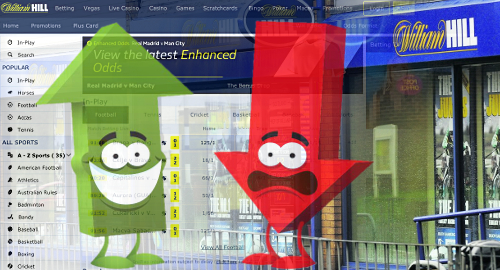 UK bookmaker William Hill saw its online gambling revenue surpass retail operations for the first time in 2019, largely due to the forced shrinkage of its UK real estate.
UK bookmaker William Hill saw its online gambling revenue surpass retail operations for the first time in 2019, largely due to the forced shrinkage of its UK real estate.
Figures released Wednesday show Hills generating revenue of £1.58b in 2019, a 2% decline from 2018’s result, while booking a net loss of £37.6m versus a £722m loss in 2018. The 2018 results were the result of a major writedown in the value of Hills’ UK retail operations following the government’s imposition of a £2 maximum stake on fixed-odds betting terminals (FOBT).
That stake reduction forced Hills to shutter 713 shops in Q319, which resulted in FY19’s retail revenue falling 20% to £717m. Sports betting revenue was flat at £400m while gaming revenue fell by more than one-third to £317m, which pushed retail’s share of Hills’ overall revenue to 45%, down 10 points from 2018. Retail operating profit tumbled 45% to £83.2m.
Hills’ retail share will continue to fall in 2020 as last month saw the company announce the sale of 35 betting shops in Northern Ireland and the Isle of Man to rival BoyleSports. Hills averaged over 2,300 active shops in 2018 but the revised estate currently sits at 1,533.
ONLINE ON TOP
Hills’ online gambling operations accounted for 47% of group revenue in 2019, eight points higher than in 2018. Online revenue gained 16% year-on-year to £738.3m, with gaming rising 36% to £430.7m while sports fell 3% to £307.6m due to reduced interest in race betting. Online operating profit dipped 9% to £118.8m as operating costs rose 19% and cost of sales spiked 31%.
Hills’ online growth came courtesy of its MRG (Mr Green) acquisition taking effect in January 2019, which helped boost international online revenue by 71% to £257.3m. On a pro forma basis, which assumes MRG contributing to Hills’ 2018 results, international online revenue dipped 3% year-on-year due to Sweden’s regulated market challenges, Italy’s advertising ban and Hills’ forced exit from Switzerland.
UK online revenue fell 1% (-3% pro forma) to £481m, in part due to the increase in the Remote Gaming Duty from 15% to 21% last April. Enhanced customer due diligence requirements pushed unique active customers down 14% but average revenue per UK user rose 13% following Hills choosing to “focus on yield rather than volumes.”
Hills warned that the UK government’s plan to prohibit gambling via credit cards will result in an operating profit decline of between £5m-£10m this year, as the company currently takes about 5% of its UK online deposits via this method.
WILLIAM HILL US
Hills’ US-facing sports betting unit’s share of 2019’s group revenue rose two points to 8%. Hills holds a 32% share of Nevada’s betting market, and its Nevada betting handle shot up 14% to $1.64b, revenue improved 2% to $107m while operating profit slipped 17% to $34.8m due to a double-digit rise in operating costs.
Hills’ operations outside Nevada now cover nine states and the company claims to hold a 24% share of the overall US betting market. Last year’s expansion efforts boosted handle by 208% to $655m and revenue shot up 224% to $54.8m, but expansion costs resulted in annual net loss of $33.2m.
Hills expects to launch in up to eight additional states in 2020 and claims that its overall US operations will be “broadly breakeven” this year. Hills is pinning great hopes on its new partnership with CBS Sports and casino operator Caesars Entertainment’s acquisition by Eldorado Resorts, with which Hills has an exclusive sportsbook provider deal.
UK REGULATORY PENALTY COMING
Hills warned investors that it had set aside £3m in expectation of a penalty from the UK Gambling Commission due to “systemic compliance failings” uncovered during a mid-2018 corporate evaluation of MRG’s operations prior to Hills’ acquisition.
In 2018, Hills was penalized £6.2m by the UKGC for the company’s own shortcomings in anti-money laundering and social responsibility protocols.
